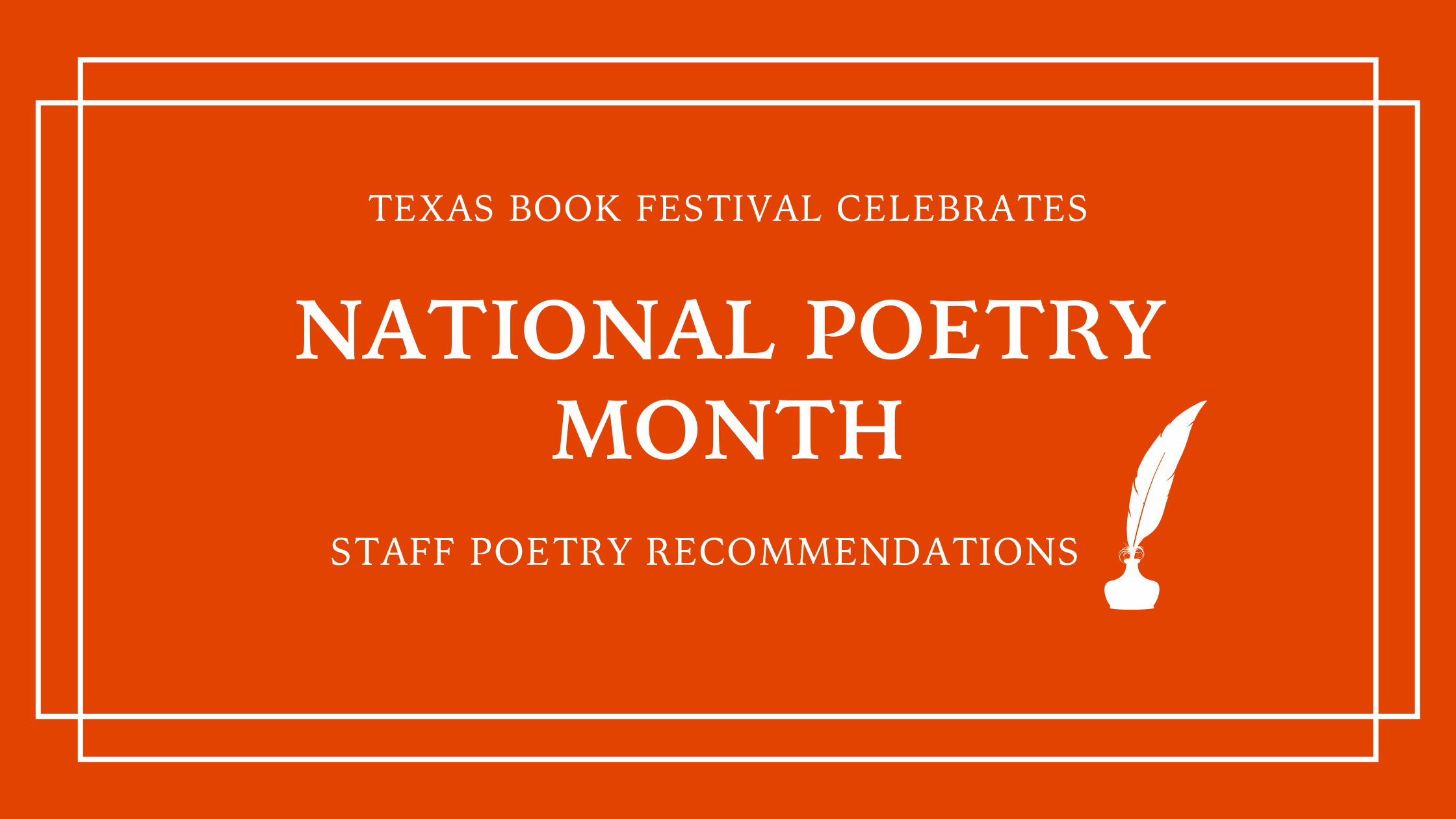In celebration of National Poetry Month, the Texas Book Festival staff would like to share some of our favorite poems. Poetry is a great way to strengthen reading, writing, and listening skills for all age groups. It also helps us to think of new ideas and improve the way we think about old ones. At its core, poetry allows us to heal and weigh our hearts and our minds – amplifying the ways in which we communicate our feelings and tell our stories.
Below are just some of the poets who have left an impression on our team, but we would love to know what poems you recommend! Share your favorite poems with us on social media (Instagram/Twitter @texasbookfest and Facebook @texasbookfestival).
“Black Lead in a Nancy Meyers Film” by Rio Cortez
Aging, at all. I want that. And to fall
perhaps most honestly in love
beside the ocean, in a home I’ve paid
for by doing as I like…
Ke’ara Hunt, Communications & Marketing Coordinator: My obsession with rom-coms has a tight hold on the way I view my life and society. Sometimes I’ll sit in a coffee shop and imagine that I can read the thoughts of men or that I’ll graciously stumble upon the perfect macaroon to match my vibrant energy. It’s all harmless daydreaming, but it can be a little detrimental as I don’t exactly fit the description of a Nancy Meyers leading lady. This poem by Rio Cortez is a little reminder that it’s okay to love…love, but I have to remember to set my own scene and cast myself as the leading lady in this beautiful thing called life.
Goldenrod by Maggie Smith
“The Grand Scheme of Things”
Claire Burrows, Deputy Director: You’ve probably read or listened to Maggie Smith’s poem “Good Bones“, and wept. Smith’s poetry is beautiful and honest and personal and feels personal for me as the reader. Her poems are sweeping and focused at the same time. Her latest book Goldenrod will make you think and remember and imagine. The poem “In the Grand Scheme of Things” ends with the lines,
We say in the grand scheme of things
as if there were one. We say that’s not how
the world works as if the world works.
Customs by Solmaz Sharif
“Patronage”
Gavin Quinn, Programs & Financial Coordinator: A book of traveling and the spaces in-between. What does it look like to live in one country, but to have strong roots in another? In addition to these things, this book is often a critique of social and poetry customs – consider the last lines of “Patronage”:
I said what I meant
but I said it
in velvet. I said it in feathers.
And so one poet reminded me
Remember what you are to them.
Poodle, I said.
And remember what they are to you.
Meat.
“The Summer Day” by Mary Oliver
I do know how to pay attention, how to fall down
into the grass, how to kneel down in the grass,
how to be idle and blessed, how to stroll through the fields,
which is what I have been doing all day.
Tell me, what else should I have done?
Doesn’t everything die at last, and too soon?
Tell me, what is it you plan to do
with your one wild and precious life?
Susannah Auby, Development Manager: Mary Oliver’s poems are filled with imagery that vivifies the natural world in all its beauty. Just when you are feeling as though everything is outside of your control, she takes you back to the one thing that is truly yours.
Honey, I Love by Eloise Greenfield
Michelle Hernandez, School & Community Programs Coordinator: When I was an elementary school teacher and it was time to read and teach and write poetry with my students, my worn copy of Eloise Greenfield’s Honey, I Love and Other Love Poems was always our favorite. When I became a mother, it was the book I used to introduce my daughter to poetry. On occasion, I reread the pages, savoring each verse, and falling in love over and over again.
My mama’s on the sofa sewing buttons on my coat
I go and sit beside her. I’m through playing with my boat
I hold her arm and kiss it ‘cause it feels so soft and warm
Honey, let me tell you that I LOVE my mama’s arm
I love to kiss my mama’s arm…
“The Jungle” by Carrie Fountain
Lois Kim, Executive Director: Sometimes a poem is lovely to read by oneself, a private affair carried out curled up on a sofa, a private exchange between poet and reader. Sometimes a poem’s power is most felt when read by the poet in front of a lot of people, with hundreds following the peaks, valleys, and turns of the poem, feeling in their bones the simplicity and complexity in all that the poet and poem are saying and doing. I felt the latter when Carrie Fountain read “The Jungle” at our recently held Gala and recommend the former for any of the poems in her latest collection, The Life.
In motherhood I begin
to celebrate my own
smallest accomplishments,
as when I wake to find
I’ve slept through the night
and I feel a little healed
because sleeping is something
I didn’t learn how to do until
I was an adult…
“Poem for Jon” by Joaquín Zihuatanejo
Matthew Patin, Literary Director: Educator and spoken-word artist Joaquín Zihuatanejo was this month named the first poet laureate of the City of Dallas, and while exploring his work, I stumbled upon a gem that demonstrates that some of the most moving poetry is neither spoken nor written:

